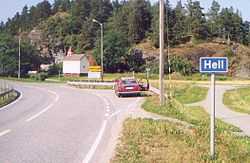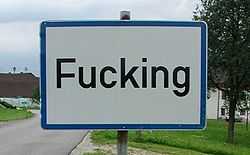Place names considered unusual
Unusual place names are names for cities, towns, and other regions which are considered non-ordinary in some manner. This can include place names which that are also swear, inadvertently humorous or highly charged words,[1] as well as place names of unorthodox spelling and pronunciation, including especially short or long names.
Swear words, humorous words or highly charged words
A number of settlements have names that are offensive or humorous in other languages, such as Fucking, Austria.[1] Although as a place name Fucking is benign in German, in English the word is a profanity. Similarly, while the town of Condom, France, has no humorous connotations in French, English speakers will likely associate it with condoms, a form of barrier contraception.[1][3] Hell, Norway, comes from the old Norse word hellir, which means "overhang" or "cliff cave". In modern Norwegian the word for hell is helvete. Conversely, a number of place names can be considered humorous or offensive by their inhabitants, such as the German towns Affendorf (Monkey Village), Faulebutter (Putrid Butter), Fickmühlen (Fuck Mill), Himmelreich (Kingdom of Heaven), Katzenhirn (Cat Brain), Plöd (Stupid), Regenmantel (Raincoat), Sklavenhaus (Slave House) and Warzen (Warts).[4]
Some placenames are offensive due to their no longer being acceptable, often through historic changes in what is tolerated.[5][6][7] An example of this would be the once common English street name Gropecunt Lane. During the Middle Ages the word cunt may often have been considered merely vulgar, having been in common use in its anatomical sense since at least the 13th century. Its steady disappearance from the English vernacular may have been the result of a gradual cleaning-up of the name; Gropecuntelane in 13th-century Wells became Grope Lane, and then in the 19th century, Grove Lane.[8] A similar case was in the town of Sasmuan, Pampanga in the Philippines, where it was formerly known as "Sexmoan" based on attempts by Spanish friars to transcribe "Sasmuan"; it was unanimously changed into Sasmuan in 1991 due to negative sexual connotations associated with the place name.[9][10]
Sometimes settlement names are changed as a publicity stunt or to promote tourism; Truth or Consequences, New Mexico changed its name from Hot Springs in 1950, after the host of the television show Truth or Consequences promised free publicity to any town willing to change its name to that of the show.[11] In 2007, the town of Halfway, Oregon changed its name to Half.com, after the e-commerce start-up of the same name for one year in exchange for $110,000, 20 computers for the school and other financial subsidies.[12]
Unorthodox spelling or pronunciation
Unorthodox spelling or pronunciation, short or long names, and names derived from unusual sources are often seen as unusual, especially by people outside the culture which named them. The Welsh village Llanfairpwllgwyngyllgogerychwyrndrobwllllantysiliogogogoch changed its name in the 1860s from the shorter Llanfairpwllgwyngyll to increase its publicity. At 58 letters, it has the longest place name in the UK.[13] Conversely, there are several settlements whose name consists of only one letter. A number of Scandinavian towns are named Å. The name often comes from the Old Norse word Ár, meaning small river. Examples include: Å, Åfjord; Å, Meldal; Å, Lavangen and Å, Tranøy.[14]
There are a number of place names that seem unusual to English speakers because they do not conform to standard English orthography rules. Examples include the Welsh towns of Ysbyty Ystwyth and Bwlchgwyn which contain no vowels characters (although y and w represent vowel sounds in Welsh).[15] Eiao, Marquesas Islands and Aiea, Hawaii, on the other hand, contain only vowels and no consonants.[16]
Road sign theft
Due to increased notoriety, road signs are commonly stolen in Fucking, Austria, as souvenirs[17] — the only crime which has been reported in the village.[18] It cost some 300 euros to replace each stolen sign, and the costs were reflected in the taxes that local residents pay.[19] In 2004, owing mainly to the stolen signs, a vote was held on changing the village's name, but the residents voted against doing so.[20] Tarsdorf municipality's mayor Siegfried Höppl stated that it was decided to keep the name as it had existed for 800 years,[20] and further stated that "[e]veryone here knows what it means in English, but for us Fucking is Fucking—and it's going to stay Fucking."[21] In 2010, the inhabitants of Shitterton, Dorset, purchased a 1.5-ton block of Purbeck Stone to place at the entrance to Shitterton, carved with the hamlet's name to prevent theft.[22] A truck and crane were hired by volunteers to put the stone in place, at a total cost of £680.[22][23]
See also
- List of names in English with counterintuitive pronunciations
- List of long place names
- Toponymy, the study of place names
References
- ↑ 1.0 1.1 1.2 Pike, Steven (6 August 2012). Destination Marketing. Routledge. p. 230. ISBN 978-1-136-00265-6.
- ↑ "F***ing signs now theft-proof". Ananova. Archived from the original on 2005-09-30. Retrieved 2006-12-15.
The Austrian town of F***ing has erected theft-proof road signs embedded in concrete blocks. Officials acted because they were fed up with English-speaking tourists stealing them as souvenirs.
. - ↑ Lyall, Sarah (2009-01-22). "No Snickering: That Road Sign Means Something Else". The New York Times.
- ↑ "Schluss mit Plöd! - Wie ein lustiger Ortsname zur Last wird". TZ (in German) (Munich). 14 November 2008.
- ↑ Kenney, Michael (2006-05-30). "Geographer explores place names that offend - The Boston Globe". Boston.com. Retrieved 2010-08-17.
- ↑ Adams, Guy (2010-02-28). "Americans redraw the map to erase 'offensive' names - Americas, World". London: The Independent. Retrieved 2010-08-17.
- ↑ "UK | England | Sussex | Council lists banned road names". BBC News. 2009-01-04. Retrieved 2010-08-17.
- ↑ Briggs, Keith (1 April 2010), "OE and ME cunte in place-names" (PDF), Journal of the English Place-name Society, 41, 26–39 (keithbriggs.info), retrieved 7 July 2010
- ↑ "Santa Lucia Church, Sasmuan, Pampanga". Retrieved 15 January 2015.
- ↑ Jennings, Ken (17 April 2012). Maphead: Charting the Wide, Weird World of Geography Wonks. Scribner. ISBN 1439167184.
- ↑ Carpenter, Cindy; Fletcher, Sherry (2010). Truth Or Consequences. South Carolina, USA: Arcadia Publishing. p. 7. ISBN 9780738579177.
- ↑ "What Ever Happened to Half.com, Oregon?", Design Observer Observery (The Design Observer Group), retrieved December 30, 2011
- ↑ Devashish, Dasgupta (2010). Tourism Marketing. New Dehli, India: Dorling Kindersley (India). p. 246. ISBN 9788131731826.
- ↑ Rygh, Oluf (1901). Norske gaardnavne: Søndre Trondhjems amt (in Norwegian) (14 ed.). Kristiania, Norge: W. C. Fabritius & sønners bogtrikkeri. p. 23.
- ↑ Rowland, Paul (1 November 2013). "14 Welsh place names with no (English) vowels". Wales Online.
- ↑ Eckler, Albert Ross (1969). "Word Ways". The Journal of Recreational Linguistics (Word Ways) 7–8: 146.
- ↑ "Urban Legends Reference Pages: Welcome to Austria". Snopes.com. Retrieved 2013-03-26.
- ↑ Harnden, Toby (28 August 2005). "'No, there are no F***ing postcards'". The Daily Telegraph (London). Retrieved 2009-11-07.
- ↑ "What's the F---ing joke?". The Age. 3 September 2005. Retrieved 2009-10-25.
- ↑ 20.0 20.1 "Brits steal carloads of F**king Austrian roadsigns", The Register, 15 August 2005.
- ↑ Haywood, Anthony; Walker, Kerry (2008). Austria (5 ed.). Lonely Planet. p. 217. ISBN 1-74104-670-X. Retrieved 2009-11-07.
- ↑ 22.0 22.1 "Sign Of The Times: Shitterton Hits Back". Sky News. 23 July 2010. Retrieved 5 January 2013.
- ↑ "Village 'amusing' name set in stone". Belfast Telegraph. 23 July 2012. Retrieved 5 January 2013.


